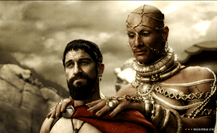|
Zack Snyder's 300, machismo, Jung and historical authenticity
Hen and Peacock
by Shahzad Rahmati
|
 A mediocre film directed by a talented filmmaker A mediocre film directed by a talented filmmaker
300 is one of the latest examples of the adverse impact of the studio system on the work of a talented young filmmaker. With his first feature film, Dawn of the Dead, which was a not-so-loyal remake of George Romero's classic work, Zack Snyder made a surprisingly good horror movie. Unlike many other reconstructed films, it was a witty zombie movie like 28 Days Later, Land of the Dead and Shaun of the Dead. The film was full of intelligently made horrific moments and moments that left an emotional impact thanks in part to its calculated characterization. None of the characters were literally protagonists or heroes. The focal characters were a group of ordinary people devoid of heroic characteristics from the very beginning. Their heroic nature was discovered and revealed gradually in the course of their violent experiences. These characters gradually learned characteristics such as bravery, solidarity against the enemies and making sacrifice for each other. But what raised the film even above this surface was that at the same time they also learned to fight and destroy the zombies pitilessly in spite of their almost human appearance. Snyder's film had also updated the social and political ironies of Romero's film.
The outstanding talent showed by Snyder in his debut film caught the attention of the studio managers who are always on the lookout for young talents. The outcome is 300, which regardless of the historical distortions with which we shall deal later, is a well made entertaining commercial movie that could have been made by any mediocre director. In fact, it is less than what could be expected of a director such as Snyder.
Jung, Snyder and Machoism
In fact 300 like many similar Hollywood films, is based on the same idea that was put forward by C. G. Jung several decades ago. Explaining the evolution of a masculine human being, while discussing adolescence, Jung says that young adult boys enter this stage while leaving behind their dependency on their mothers and the relevant motherly/womanly attributes. During the next few years, they try to adapt to new patterns that negate and humiliate feminine attributes and get attracted to masculine attributes and characteristics. At this stage, anything with any resemblance to machoism becomes attractive to them.
A review of the comments on 300 in websites like IMDB reveal that some 90 percent of the comments had been left by male readers many of whom were adolescents. This statistics about a film based on utterly machoistic ideas is natural. The film basically praises machoism. Obviously the producers of this film had counted on the welcome it could receive from young male audiences. The international sales figures prove that they had been right. The fact that the protagonists are Spartans who attach great value to machoism has made the filmmakers able to praise these values in the film in a direct way that often lacks any delicacy.
Almost everything in this film serves the same purpose. There is an omnipresent stress on the half-naked sinuous figures of Spartan soldiers, their interest in fighting and killing, their horrendous masculine war cry and their devotion to these values in the dialogues. As an example, remember the scene where the Iranians shower the Spartans with arrows and they take it with joyful laughter and call Iranians rascals who fight from a distance. All these ideas, of course, have found their way into the film from Frank Miller's comic book on which the film is faithfully based. This characteristic is also evident in other works by Frank Miller. Machoism is also praised in Sin City, which is also based on the works of Frank Miller, but is more elaborate in 300, in a way that it could be sometimes mistaken for homoeroticism. In fact, the appreciation of the masculine body is done so passionately that it develops some kind of sexual connotation. The stress on the blood-stained sweating muscular bodies and the elaboration of masculine friendship bonds among the Spartan soldiers and their amorous devotion to their commander, Leonidas will inevitably bring to mind an association with homoerotic motifs. ....
SUBSCRIBE
[Page: 162]
|
|
|
|
|
President & Publisher
Massoud Mehrabi
Editors:
Sohrab Soori
Translators:
Behrouz Tourani
Sohrab Soori
Zohreh Khatibi
Contributors
Shahzad Rahmati
Saeed Ghotbizadeh
Advertisements
Mohammad Mohammadian
Art Director
Babak Kassiri
Ad Designers
Amir Kheirandish
Hossein Kheirandish
Correspondents
E.Emrani & M. Behraznia (Germany)
Mohammad Haghighat (France)
A. Movahed & M. Amini (Italy)
Robert Richter (Switzerland)
F. Shafaghi (Canada)
B. Pakzad (UAE)
H. Rasti (Japan)
Print Supervisors
Ziba Press
Raavi Press
Blue Silver
Subscription & Advertising Sales
Address: 10, Sam St., Hafez Ave., TEHRAN, IRAN
Phone: +98 21 66722444
Fax: +98 21 66718871
info@film-magazine.com
Copyright: Film International
© All rights reserved,
2023, Film International
Quarterly Magazine (ISSN 1021-6510)
Editorial Office: 5th Floor, No. 12
Sam St., Hafez Ave., Tehran 11389, Iran
*
All articles represent views of their
authors and not necessarily
those of the editors.
|
|
|

